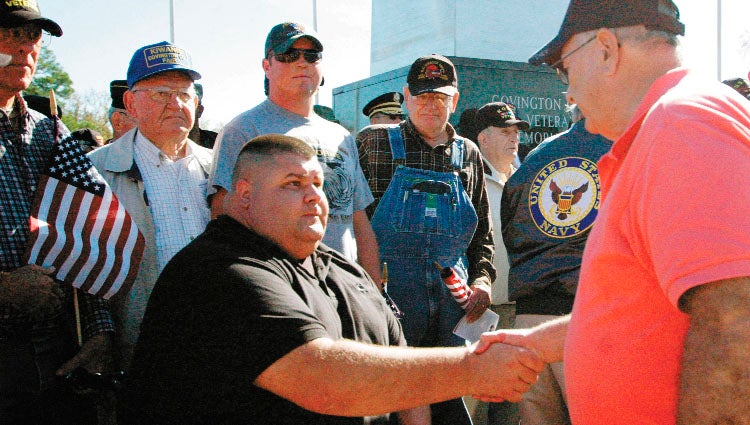A grateful nation
Published 12:00 am Tuesday, November 12, 2013

Carroll Mullins shakes the hand of the day’s guest speaker, retired Army specialist Lance Gielselmann. Others wait their turn.
The crowd was silent as retired Army specialist Lance Gieselmann told his story.
The squeaks and fidget noises that usually fill the air when a speech is made were noticeably absent. It was as if even the wind was paying close attention as Gielselman told the crowd at Andalusia’s Veterans Day event what it means to pay the ultimate price for freedom.
“Freedom isn’t free,” said the Dothan native who joined the Army in May 1999. When money ran out for the-then college lineman pursing a degree in sports medicine who had dreams of the NFL, Gielselmann said he turned to the military.
“I wanted to be all I could be and do something my family and friends could be proud of,” he said – never imagining he would go above and beyond his expectations.
The crowd listened intently as Gielselmann described the day in April 2003, when during a deployment to Iraq with the 3rd Battalion, 67th Armor Regiment, a simple supply run changed his life forever.
“I apologize if I stutter through this, but this is the 10th anniversary of my accident,” he said. “First, I want to thank those brave warriors who cleared the way for this generation of warriors. I want to give my thanks to those like myself who have felt the pain of losing friends and family to war. Though they are gone, they are never forgotten. I’d never truly realized what the words, ‘Freedom isn’t free,’ truly meant until I lost two of my best friends.”
As a gunner on an M1A2 Abrams tank, Gielselmann said he’d been on many different missions, but it was on his last mission, “That my Army life ended and my new life began.”
Gielselmann, who’s prime mission was to guard a water pumping station near Delaud, Iraq, told of the day when he volunteered to pick up supper for the men after crews had worked most of the day on his tank.
“It wasn’t our turn,” he said. “But because we worked together, I made it a point to make life better whenever they helped me out.
“We picked up fuel and food for eight people – the first real meal since we’d arrived,” he said. “That beef stew smelt delicious; we’d gotten mail. My gunner, Sgt. Michel Guarerra, was talking about how much he loved the girl from Spiderman. My driver, Isaac, talked about his dreams of being in the MMA when he got out of the Army.
“We were only about a mile from base camp, when we turned down a one-laned road,” he said. “I turned to my side, because I thought I saw a goat. I remember thinking that was weird since we were out in the middle of nowhere.
“I blinked and the next time I blinked I was on the ground, I thought, ‘Where is my tank? How did I get on the ground? Why is my leg on the wrong side o my body? Where’s my crew?”
Gielselman said he called out for his friends. One answered, the other did not. He went on to describe how a truck, full of enemy fighters, converged onto the accident site. After telling his friend to play dead, Gielselman said he turned to prayer to get him through.
“I don’t know why, but a song from Bible camp stuck in my head as I laid there and prayed,” he said. “Micah 6:8: ‘He has shown thee, O man, what is good. And what does the Lord require of thee?’ When I got done singing that song, they were gone.”
It was 40 minutes before help arrived. Gaurerra died from shock, his other friend was decapitated.
Gielselman was sent to Hamburg, Germany, with shrapnel millimeters from his heart, a broken back and a left leg so mangled that it had to be amputated. Four weeks later he awoke with his wife standing beside his bed. She told him what happened.
“They had buried five 5155 rounds and a hundred pounds of C-4. Put a cell phone detonator on it and they had been watching us for three months,” he said.
He spent a year in the hospital, thinking of the loss of his two brothers, but still he found the will to go on, he said.
“For some, it is very hard to deal with – even for myself, but my faith in the Lord and his continued grace in my life is what sustains me,” he said. “All who serve have a story to tell. Out of three, God chose me to stay behind to tell our story to those who have never served or sacrificed what it looks and sounds like.
“I’m that voice who paid the ultimate price so that we can be free,” he said. “I speak to honor those that can’t be here to walk their daughters down the aisle at their wedding; for the mothers who can’t be here no longer to kiss away their children’s pain or calm their fears; for those who will never see their children grow up, I speak to honor them. Freedom isn’t free. God bless the soldier and continue to bless the United States.”
Gielselman continues to focus on his future.
He is currently pursuing vocational rehab to learn “every skill I never did in life – like being an electrician, plumbing, carpentry, contracting, welding, mechanic – all the things I wish was good at, but stink at.”
At the present, he said he is content to coach his children’s sports teams, which consist of everything from football and basketball to gymnastics and cheerleading.
After the day’s ceremony, veterans and their families were treated to a reception at Andalusia City Hall.





